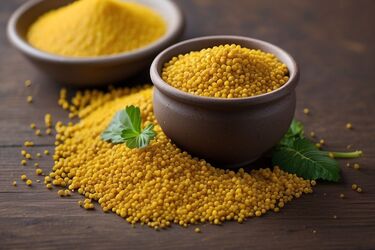Mustard is very underestimated: what are the benefits and who is strictly prohibited

BLOG
Mustard contains antioxidants and other beneficial plant compounds that are believed to help protect the body from damage and disease. For example, it is a good source of glucosinolates, a group of sulfur-containing compounds found in all cruciferous vegetables, including broccoli, white cabbage, Brussels sprouts, and mustard. Glucosinolates are activated when the leaves or seeds of a plant are damaged, either by chewing or cutting. They are believed to stimulate the body's defense against disease.
Mustard seeds and leaves are particularly rich in these substances:
Isothiocyanates. These compounds are derivatives of glucosinolates and help prevent the growth or spread of cancer cells.
Synigrin. Gives mustard a pungent flavor and specific odor. It is believed to have anti-inflammatory, antibacterial, antifungal, antitumor, and wound-healing properties.
Carotenoids, isorhamnetin and kaempferol. Research has linked these flavonoid antioxidants to protection against type 2 diabetes, heart disease, and possibly even some cancers.
HELPS PROTECT AGAINST CERTAIN DISEASES
For centuries, mustard has been used as a traditional remedy for a variety of ailments. Recently, scientific evidence has emerged to support certain health benefits:
It lowers blood sugar. In one small study, it was demonstrated that drinking a decoction of green mustard helped lower blood sugar levels in people with type 2 diabetes comparable to the effect of antidiabetic drugs.
Protects against psoriatic inflammation. Animal studies show that a diet rich in mustard seeds helps reduce inflammation and promotes the healing of lesions caused by psoriasis.
Reduces symptoms of contact dermatitis. According to animal studies, mustard seed accelerates healing and reduces the symptoms of contact dermatitis, a condition in which a rash appears on the skin after contact with an allergen.
Provides protection against infections. The antioxidants in mustard seeds provide some protection against bacteria and fungi, including E. coli, B. subtilis, and S. aureus. However, some studies do not confirm such protective effects.
Protects against some types of cancer. In vitro and animal studies show that the glucosinolates in mustard help kill cancer cells or prevent their spread. However, more research with humans is needed.
Despite the promising results, the number of studies confirming these benefits remains small. In addition, most of them were conducted in vitro or on animals using mustard extracts. Therefore, it is unclear whether consuming the seeds, leaves, or mustard sauce will have a similar effect. More research is needed before conclusive conclusions can be drawn.
SAFETY AND POSSIBLE SIDE EFFECTS
Eating mustard seeds, leaves, or mustard sauce is generally considered safe for most people. Especially if consumed in amounts typical of an average diet. Consumption in large quantities, such as those found in mustard extracts, can lead to abdominal pain, diarrhea, and intestinal inflammation.
There was also a case of a woman who developed contact dermatitis after applying a patch containing mustard seeds to her skin.
Raw mustard seeds and leaves contain a significant amount of goitrogens. These compounds can interfere with the normal functioning of the thyroid gland, whose hormones are responsible for regulating metabolism. They are unlikely to be a problem for people with normal thyroid function. However, for those with impaired thyroid function, it is recommended to soak or boil mustard seeds and leaves before eating them or limit their consumption altogether.
Otherwise, there is no great risk from adding mustard to your meals. In addition to the mustard sauce, you can eat the leaves and seeds of this plant.

